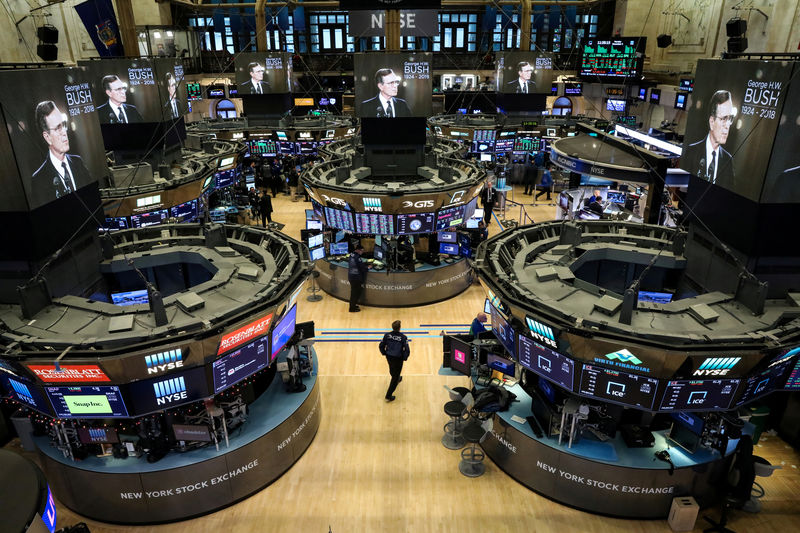
The New York Times reports: "Stocks rose on Wall Street Monday after President Trump and President Xi Jinping of China reached a truce in the countries' trade war. Shares of industrial stocks rose, as exporting giants such as Boeing, Caterpillar and Deere pulled the export-reliant S&P 500 industrial sector higher. Semiconductor makers, which have been hurt by the potential for the trade war to disrupt their widespread production networks in Asia, rose as well. Those early gains, however, were tempered by doubts that the fragile cease-fire — essentially a 90-day postponement of planned additional American tariffs on Chinese imports — would put the dispute between the world's two largest economies to rest permanently. After gaining nearly 1.4 percent in early trading Monday, the S&P 500 was up by less than 1 percent by late morning. 'Just because they have a truce for three months doesn't mean this thing is going away,' said Jurrien Timmer, director of global macro at asset manager Fidelity Investments in Boston. The rally in American stocks followed solid increases in Asian and European equity markets."
The Washington Post reports: "China seems to have a markedly different view of the trade war cease-fire reached with the Trump administration over the weekend, with state media making no mention Monday of a 90-day time frame or a reduction in tariffs on imported American cars — or indeed any specifics about buying more American products. That raises the prospect that the two sides have come away from their meeting in Buenos Aires, on the sidelines of the Group of 20 summit, with very different ideas about what comes next. 'Do we have another Singapore summit, where the North Korean delegation went home with a very different set of perspectives?' asked Paul Haenle, an Asia adviser to presidents George W. Bush and Barack Obama, now running the Carnegie-Tsinghua Center in Beijing. He was referring to the June summit between President Trump and North Korean leader Kim Jong Un, which seemed to produce different definitions of the word 'denuclearization.'"
The Wall Street Journal reports: "Chinese regulators have significantly slowed approving independent movies imported from the U.S., the latest sign of tension between Hollywood and its most important foreign market. Producers and distributors say the regulators are keeping the smaller films mired in bureaucratic red tape for months longer than normal. Meanwhile, money has stopped flowing out of China, and new Communist Party regulations have been enacted against non-Chinese programming. The result is that parts of the entertainment industry that once benefited from nonstop growth in China have now been hit by the same trade dynamic roiling goods from soybeans to semiconductors. 'Things have just ground to a halt,' said Kirk D'Amico, chief executive of Myriad Pictures, a Los Angeles production and distribution company. As with most deal making in China, it's hard to say with certainty what is behind the slowdown: Regulators never offer explanations for their decisions, and other actions by the Chinese government also have made it harder for Hollywood to do business. Still, producers and executives say getting movies into China and getting funds out has grown more difficult alongside worsening relations between the two countries."
- 2018-12-02 Trump's China Trade Truce
- 2018-11-30 US 'could be entering Cold War with China' over trade, Yale economist warns
- 2018-11-29 U.S., China Exploring Deal to Ease Trade Tensions
- 2018-11-28 ‘Bring Me Tariffs’—How Trump and Xi Drove Their Countries to the Brink of a Trade War
- 2018-11-27 China citizens are proud the country can compete with the US on AI, venture fund manager says
- 2018-11-26 China Works to Look Open to Foreign Business as G-20 Summit Nears
- 2018-11-25 China courts potential allies in trade war with US
- 2018-11-21 Five Takeaways From Our New China Project
- 2018-11-20 China's President Xi Jinping Visits the Philippines to Deepen Ties With the U.S. Ally
- 2018-11-19 APEC fails to reach consensus as US-China divide deepens
- The New York Times Stocks Rise After U.S. and China Put Trade War on Hold
- The Washington Post After Trump summit, no mention in China of 90-day deadline or trade concessions
- The Wall Street Journal Smaller Movies Finding Big Problems in China
- The Atlantic The Blurring Boundaries Between Hong Kong and Mainland China
- TIME Why Chinese Authorities Are Cracking Down on 'Extravagant and Wasteful' Weddings
- CNN UBS beats Wall Street rivals by taking control of its China business
- The Wall Street Journal China to 'Reduce and Remove' Tariffs on American Cars
- CNBC Trade war or not, experts say China's yuan is poised to become a global heavyweight
- Huffington Post China Is Using U.S. 'War on Terror' Rhetoric To Justify Detaining 1 Million People
- Politico Trump says China relations took 'BIG leap forward' following trade pact
- CNBC Cracking the Chinese market requires patience and localization, Western executives say
- The Wall Street Journal China 'Is the Only One in the Race' to Make Electric Buses, Taxis and Trucks
- TIME The Whereabouts of China's Gene-Editing Doctor He Jiankui Remain Unknown
- Foreign Policy Trump and Xi Park Trade War – For Now
- CNBC Soybean prices, Deere shares jump after China agrees to buy 'substantial' US agricultural products
- The National Interest Here's Why China Is Flying Deadly Bombers All Over the Pacific
- The Diplomat China's Crackdown on Hong Kong's Freedoms is Bad for Business
- The Wall Street Journal Trump's China Trade Truce
- The National Interest Missiles, Fighter Jets And Much More: How China Just Showed Off Its Military Muscles
- The Diplomat The G20 Summit: Highlighting China's Headache
- Foreign Affairs Avoiding War Between America and China
- The National Interest Gun Problems: Why Russia and China Struggle to Make World-Class Pistols
